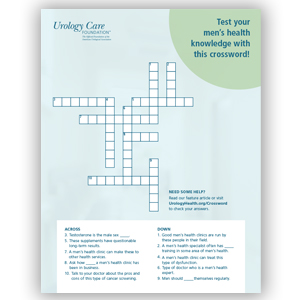| FEATURE |
Knowing Your Family History of Cancer Can Help Guide Treatment

If you are diagnosed with prostate cancer, you may not expect your doctor to ask about your family history of breast or ovarian cancer. But knowing your family history of these and other cancers can be of great value in finding the right treatment, says Todd M. Morgan, M.D., a urological surgeon and Chief of Urologic Oncology at Michigan Medicine.

“A family history of breast cancer is linked with a higher risk of prostate cancer. Some genetic mutations that raise the risk of breast cancer result in a greater risk of prostate cancer in men.”
Todd Morgan, MD
Chief of Urologic Oncology, Michigan Medicine
Prostate cancer affects about 180,000 men in the U.S. each year. About 15% of these men have more advanced and potentially deadly cancer.
Many cases of prostate cancer and breast cancer are not linked to inherited genetic mutations. But, some people do have an inherited mutation in a gene that causes prostate cancer. These genes include BRCA1 and BRCA2. Mutations in these genes also raise the risk of getting breast, ovarian or pancreatic cancer. Men with one of these mutations may be at a higher risk of a more aggressive, deadly form of prostate cancer. A family history of colon cancer may also be linked to a higher risk of prostate cancer. That is why men with prostate cancer who have a family history of any of these cancers may be advised to do testing called germline genetic testing. This type of testing looks for inherited gene mutations that raise the risk of cancer.
“If a man without prostate cancer has one of these gene mutations, they may need earlier screening for prostate cancer,” Dr. Morgan said. “They can also benefit from counseling about a healthy diet, regular exercise and quitting smoking. These things can lower their risk of prostate cancer.”
For patients with prostate cancer, knowing if you have a gene mutation can affect your treatment, Dr. Morgan said. “There are some treatments, like PARP inhibitors, that are more effective in men with one of these mutations,” he said. “Theywork by preventing cancer cells from repairing, allowing them to die.”
When to Test
Your doctor may suggest genetic testing if:
- You have cancer that has spread. About 12% of these men have a mutation that may cause cancer. “These patients need to talk to a genetic counselor, because certain family members might also want to undergo testing,” Dr. Morgan said.
- You have a high Gleason score. This is the grading system used to tell how aggressive a man’s prostate cancer is. For men with a Gleason score of 8 and above, the doctor may suggest genetic testing.
- You’ve been diagnosed with prostate cancer that hasn’t spread and have a strong family history of prostate, breast, ovarian, colon or pancreatic cancer. “For these patients, we think there may be some inherited cause contributing to their prostate cancer. Genetic testing may tell us if it’s likely to be more aggressive,” Dr. Morgan said.
Genetic testing in these men may not be needed right away, he said. “When a man is diagnosed with localized prostate cancer, there’s a lot to discuss about the types of treatment. Talking about genetics right away can create more stress,” Dr. Morgan said. “In men with cancer that hasn’t spread, it can sometimes be helpful to delay talking about genetic testing until after they complete treatment.”
Your doctor may also suggest genetic testing if:
- You have been diagnosed with prostate cancer before age 50.
- You have a relative who has a genetic mutation that’s linked with a higher risk of prostate cancer.
- You are of Ashkenazi Jewish ancestry, as this may increase the risk of a BRCA mutation.
Men with advanced prostate cancer can sometimes benefit from another type of genetic testing called somatic testing. This looks at the DNA of the tumor itself. Somatic testing may also help doctors decide what drugs might work best.
Factors to Consider in Genetic Testing
If you are being treated at a major medical center, your doctor may refer you to a genetic counselor. In other centers, your doctor may counsel you about genetic testing. Before you meet, find out as much about your family history of cancer as you can. This will help the counselor or doctor to advise you.
“It is of great value to talk about the pros and cons of genetic testing before making a decision,” Dr. Morgan said. “There are potential drawbacks, including the stress involved in testing.”
The results could also affect a person’s ability to obtain health, life or disability insurance. “There are federal legal protections in place. But there are still a number of loopholes,” he said. “This is an especially big decision for a young person, who may not yet have life or disability insurance.”
If you decide to go ahead with testing, the next step is the test itself. This is either a blood or saliva test. Results take about two to six weeks.
“About 80% of patients get a negative test. This means they don’t have the mutation,” Dr. Morgan said. In some cases, a person will get a result that says they have a ‘variant of uncertain significance.’ “This means we don’t know if the mutation is cancer-causing or not,” he said. “Getting this result can be stressful.” As more research is done on inherited genetic mutations, scientists will learn more about these uncertain results. The vast majority of these results turn out to be harmless. If you get an uncertain result, you may find out in the future whether your mutation is clearly harmful or not harmful.
“If you do have prostate cancer, knowing you have a genetic mutation can impact treatment,” Dr. Morgan said. “But most of the time we don’t find anything on a genetic test, and that’s very reassuring.”
More Information
To hear Dr. Morgan talk more about Genetic Testing for Prostate Cancer, check out the below podcast.
For more information, visit UrologyHealth.org.

Test your men's health and urology knowledge with this crossword! Click on the puzzle to download.
Need some help?
Read through the feature article or visit UrologyHealth.org/Crossword to check your answers.
UrologyHealth.org | FALL 2022 | UROLOGYHEALTH extra